
-
Find the right food for your pet
Take this quiz to see which food may be the best for your furry friend.
Find the right food for your pet
Take this quiz to see which food may be the best for your furry friend.
Featured products
 Adult 7+ Perfect Digestion Chicken, Whole Oats & Brown Rice Recipe Dog Food
Adult 7+ Perfect Digestion Chicken, Whole Oats & Brown Rice Recipe Dog FoodScience Diet's breakthrough nutrition supports ultimate digestive well-being & healthy microbiome for dogs age 7+
Shop Now Adult Healthy Cuisine Roasted Chicken, Carrots & Spinach Stew Dog Food
Adult Healthy Cuisine Roasted Chicken, Carrots & Spinach Stew Dog FoodDelicious roasted chicken paired with tender vegetables in a succulent stew
Shop Now Small & Mini Savory Stew with Chicken & Vegetables Dog Food
Small & Mini Savory Stew with Chicken & Vegetables Dog FoodA delicious complement to the nutrition of Science Diet Small & Mini 7+ dog food
Shop NowFeatured products
 Adult Savory Entrée Can Variety Pack Cat Food
Adult Savory Entrée Can Variety Pack Cat FoodPrecisely balanced nutrition with the delicious taste of savory minced chicken to help fuel the energy needs of cats during the prime of their life
Shop Now Adult 7+ Tender Tuna Dinner Cat Food
Adult 7+ Tender Tuna Dinner Cat FoodWith delicious chunks in a decadent gravy
Shop Now Adult 7+ Senior Vitality Chicken & Vegetable Stew Cat Food
Adult 7+ Senior Vitality Chicken & Vegetable Stew Cat FoodImproves Everyday Ability to Get Up & Go
Shop Now -
Dog
- Dog Tips & Articles
-
Health Category
- Weight
- Food & Environmental Sensitivities
- Urinary
- Digestive
- Joint
- Kidney
-
Life Stage
- Puppy Nutrition
- Adult Nutrition
- Senior Nutrition
Cat
- Cat Tips & Articles
-
Health Category
- Weight
- Skin & Food Sensitivities
- Urinary
- Digestive
- Kidney
-
Life Stage
- Kitten Nutrition
- Adult Nutrition
Featured articles
 Do Dogs and Cats have Belly Buttons?
Do Dogs and Cats have Belly Buttons?Learn whether cats & dogs have belly buttons like humans, what the function is, and if there are any health concerns associated with it.
Read More Does My Pet Hate Me?
Does My Pet Hate Me?Learn tips for bonding with your pet if you've ever thought, 'My dog doesn't like me, or 'Why do I have a standoffish cat?'
Read More Why Are Dogs and Cats So Cute?
Why Are Dogs and Cats So Cute?If waggy puppy dog tails and furry kitten yawns make you swoon, you're not alone. Why are cats so cute? And, dogs too! Let's find out!
Read More -


Pass the tissues, please! Is your cat sneezing more than usual? Mild sneezing is a normal biological function in cats, so it's not uncommon for them to sneeze now and then. However, if your cat is sneezing continually or more frequently than usual, it may signal that something is wrong and you need to visit your veterinarian. Here are the basics of cat sneezing so you know what to expect.
How Often Should Cats Sneeze?
Cats sneeze for many of the same reasons humans sneeze. For example, it's normal for cats to sneeze if they have an itchy nose or sniffed something irritating. What's considered a normal amount of sneezing can vary, but it's generally limited to a couple of times a day. Importantly, normal sneezing isn't accompanied by nasal discharge or other signs of illness.
Occasional sneezing is nothing to worry about. But if you notice your cat suddenly sneezing more than usual, sneezing repeatedly or showing other signs they're sick, something is amiss.
Signs of Illness
Signs your cat's sneezing may indicate an underlying concern include:
- Nasal discharge of any color
- Nasal redness or swelling
- Open-mouth breathing
- Pawing at the face
- Coughing
- Fever
- Lethargy
- Loss of appetite
- Vomiting
- Bad breath
- Bloody saliva
If you notice unusual sneezing, particularly in combination with any of these signs, visit your vet.
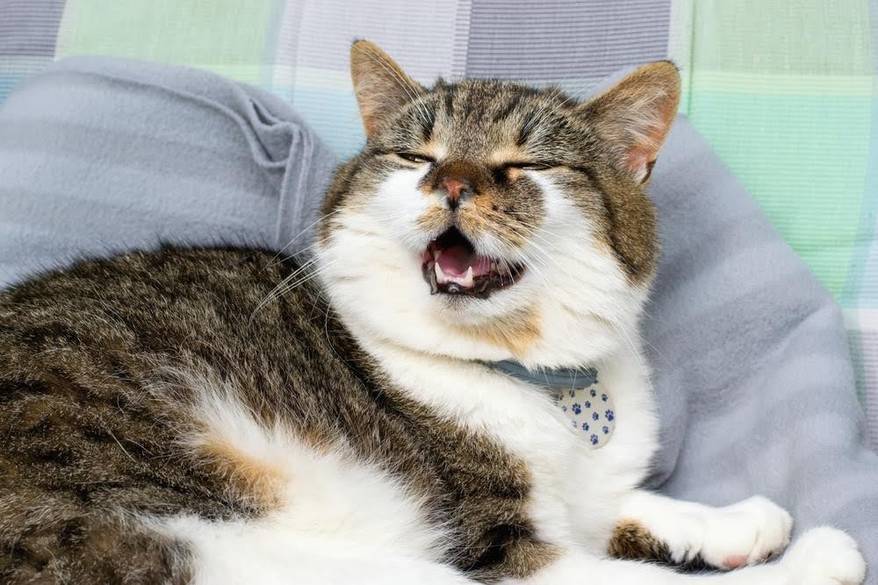
Causes of Sneezing in Cats
Anything that affects or irritates your cat's nasal passages can cause sneezing. Some conditions are self-limiting (don't require any treatment), while others are more serious and require veterinary care. Here are some of the more serious conditions that can cause sneezing in cats.
Upper Respiratory Infection
One of the most common causes of sneezing in cats is an upper respiratory infection. Viruses (such as herpes), bacteria, fungi and protozoa can infect your cat's nasal passages, causing signs such as sneezing, nasal discharge, fever, red eyes and loss of appetite.
Dental Disease
It might come as a surprise that dental disease can cause sneezing in cats, but it's true! The roots of your cat's teeth on the upper jaw are close to their nasal passages. If an upper tooth root becomes infected, it can cause swelling and inflammation, resulting in sneezing and nasal discharge. Dental disease can also cause bad breath, loss of appetite, teeth chattering and bloody saliva.
Allergies or Irritants
Cats can be sensitive to many inhaled irritants and allergens, including dust, cigarette smoke, spices, cleaning products, scented candles, pollen and dust mites, leading to sneezing and red eyes. Allergens and irritants may also contribute to feline asthma — another potential cause of excessive cat sneezing.
Foreign Material
Foreign objects, such as a blade of grass, can become stuck in your cat's nose when they attempt to munch on or sniff something. This can result in violent, repetitive sneezing, bloody discharge and facial pawing. Generally, cats must be sedated to remove foreign objects safely. Never attempt to remove something yourself without consulting your vet — instead, seek care right away.
Nasal Polyp
Nasal polyps are benign (noncancerous) inflammatory growths that can occur in your cat's nose or throat. The cause of polyps in cats isn't well understood. Signs of polyps include sneezing, nasal discharge, difficulty breathing and bad breath.
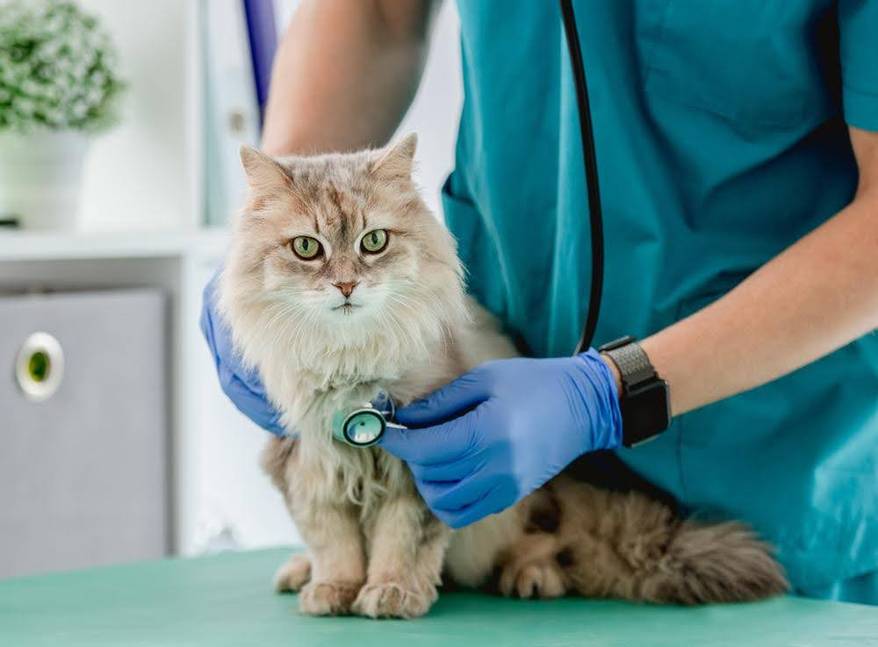
Tumor
Benign and malignant (cancerous) tumors in the nose can cause sneezing, nasal discharge and bad breath. Some nasal tumors can also lead to appetite loss and weight loss.


Tasty Tips
What to Expect at the Veterinary Clinic
When you take your cat to the vet, they'll check your cat's vitals and ask you questions about how your cat is doing at home. They'll also want to know your cat's vaccine history. Then, your vet will conduct a full physical exam and, depending on what they find, may recommend additional testing to determine the cause of sneezing. This can include bloodwork to check internal organ function and virus status and radiographs (X-rays) of the head and neck. In some cases, your vet may need to sedate your cat to remove foreign material or collect samples for biopsy or further testing.
How to Manage Sneezing in Cats
Mild sneezing in cats usually resolves on its own and typically doesn't require treatment. If your cat does need treatment, it will depend on the cause. If your vet identifies an infection, they'll prescribe medication to resolve it and minimize the associated signs. If a polyp is responsible for your cat's sneezing, they'll recommend surgical removal. And if your cat has dental disease, they'll need dental intervention.
If your cat has copious nasal discharge, your vet may recommend a series of steam therapy sessions at home to loosen nasal secretions. This usually entails keeping your cat in your bathroom for around 15 minutes while running a hot shower, but follow your vet's instructions.
In general, minimize the use of indoor irritants, such as scented candles, essential oil diffusers, cigarette smoke and harsh cleaning products, around your cat. You can also reduce their likelihood of developing upper respiratory infections by vaccinating them against upper respiratory viruses. Talk to your vet to determine which vaccines are right for your cat.
Your Vet Knows Best
Mild, intermittent sneezing is a normal biological function in cats, and the occasional sneeze is nothing to worry about. But if your cat is sneezing often, suddenly or repeatedly — particularly if they're acting or looking sick in any way — check in with your vet. They're your partner in supporting your cat's health and well-being, so take advantage of their knowledge, training and love. It takes a village!
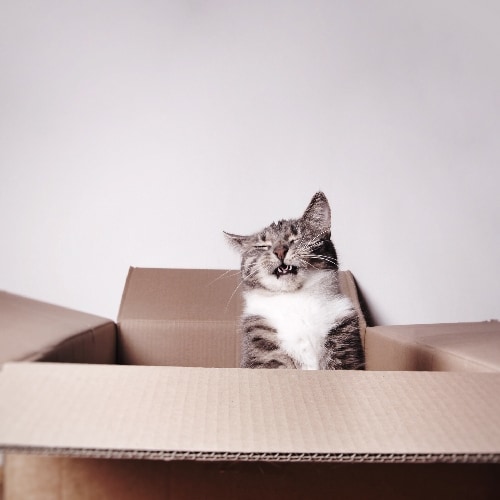


Dr. Sarah Wooten graduated from UC Davis School of Veterinary Medicine in 2002. A member of the American Society of Veterinary Journalists, Dr. Wooten divides her professional time between small animal practice in Greeley, Colorado, public speaking on associate issues, leadership, and client communication, and writing. She enjoys camping with her family, skiing, SCUBA, and participating in triathlons.
Related products
Related articles
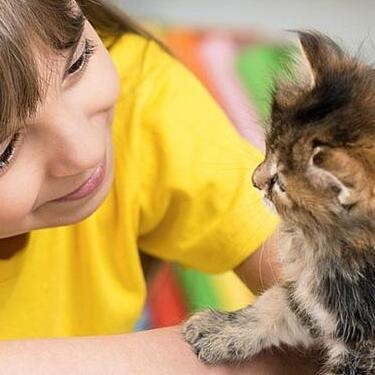
Discover how to train your cat, starting with very basic first steps that both reward good behavior and discourage the bad.
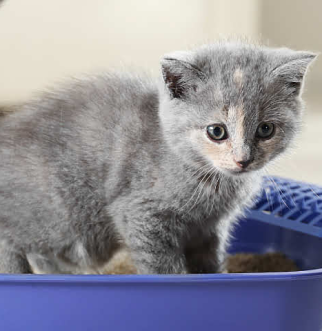
Cats are naturally very clean and chances are your kitten will already have learned how to use the litter box from her mother before she comes to live with you.

What is the best food for an overweight cat? Learn all about weight control food for cats, including what's in it and how it works.

How do you get a cat to lose weight? Learn all about cat foods for weight loss, including how to choose weight control cat food and exercise tips.

Put your cat on a diet without them knowing
Our low calorie formula helps you control your cat's weight. It's packed with high-quality protein for building lean muscles, and made with purposeful ingredients for a flavorful, nutritious meal. Clinically proven antioxidants, Vitamin C+E, help promote a healthy immune system.
Put your cat on a diet without them knowing
Our low calorie formula helps you control your cat's weight. It's packed with high-quality protein for building lean muscles, and made with purposeful ingredients for a flavorful, nutritious meal. Clinically proven antioxidants, Vitamin C+E, help promote a healthy immune system.

